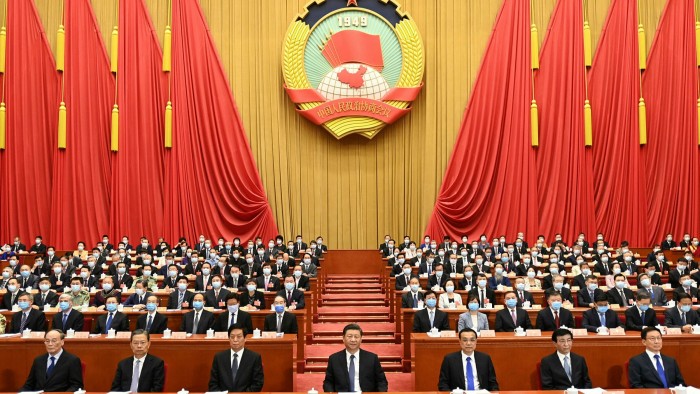Politics trumps money in Chinese markets

Roula Khalaf, Editor of the FT, selects her favourite stories in this weekly newsletter.
The writer is a Shanghai-based independent economist
Some investors assume China knows what it expects the end game of its current interventions in the private sector to be. That is likely to be wrong.
In the case of troubled property developer Evergrande, Beijing is clearly seeking to cool an over-indebted sector and inject greater discipline with stricter rules on borrowing. But more broadly with the crackdown on the tech and education sectors, it is seeking to rein in capitalism itself. How far that goes remains to be seen.
Take the tech sector for example. Even Beijing may not know whether it will be comfortable with Big Tech in the future and in what form. The chances are that the Chinese Communist party will keep a wary eye on internet-based businesses for years to come.
On the surface, the government complains that big internet companies are monopolies and abuse their market power for profit. Both points are true. Ending exclusive content arrangements, for example, is one way the government is trying to rein in the market power of the existing players.
But will this be effective? Google’s search engine is dominant despite there being no exclusive arrangement in place. Big data-driven businesses are self-reinforcing, and the successful ones tend to exhibit monopoly-like market shares. If market share is the issue, the government will have to do much more.
The monopoly problem is unlikely to be the main reason for the crackdown. After all, the Chinese government helped them to become monopolies in the first place. Over the past decade, Beijing tried to replicate successful US internet companies so that Chinese users need not long for the American experience.
The enormous pay-offs for early investors in Tencent and Alibaba have led to huge amounts of risk capital pouring into China’s internet sector. But the trade tensions between the US and China showed the government what was really important. China needs advanced chips to stay ahead.
Internet companies merely make existing goods and services easier and more convenient to acquire. The CCP could easily tolerate a little more inconvenience for the people for a broader aim. The government now wants to have the final say over capital allocation.
Perhaps the biggest threat to Beijing is that big internet companies may weaken one-party rule over time. The CCP has been on a multiyear campaign to secure its reign for another century. To achieve this, it needs popular legitimacy. But it is competing for the attention of the masses with the internet companies.
This worries Beijing even as it uses Alipay and WeChat to reach the populace with its “health code” system introduced during the Covid-19 pandemic. This assigns a health status to citizens, indicating whether they can travel freely or not.
The only way for the CCP to shore up its position is to cut off the competition. The party had a complete grip on the economy and populace during the Cultural Revolution. How much control would make it happy this time is anyone’s guess. This is why the crackdown on Big Tech could last for a long time.
Some may question how the economy could remain robust when risk capital and private businesses have one hand tied behind their back. But the past five years demonstrate that the Chinese economy can take a lot of pressure and keep on ticking. China’s exports are likely to reach $3.5tn this year, $1tn more than when the trade war began in 2018.
The secret sauce is an undervalued exchange rate, just like it had been for other east Asian economies in the past. China’s infrastructure and mass education have already reached or even surpassed OECD levels. But per capita income at the official exchange rate is only 30 per cent of gross domestic product.
The Chinese currency is undervalued by at least one-third. An east Asian mandarin state can channel excessive monetary growth from an undervalued exchange rate into capital formation, turning inflationary pressure into export expansion. This powerful tailwind can keep China going as long as the west, especially the US, keeps stimulating consumption.
Modern China has gone through rounds of revolution, reform and restoration. The CCP did three decades of revolution, four decades of reform and is now embracing restoration.
Its main objective is to meld a high-tech modern market economy with a traditional Chinese top-down power structure; money, fame and business cannot be allowed to challenge the prevailing order.
Comments